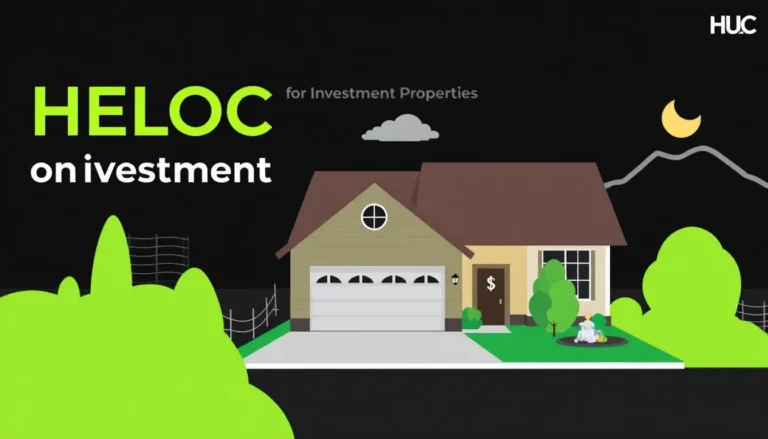Table of Contents
ToggleImagine turning your home into a money-making machine while you sip coffee in your pajamas. With an investment property home equity loan, that dream can become a reality. This financial tool lets homeowners tap into their property’s equity, unlocking cash to invest in more properties, renovate existing ones, or even fund that tropical getaway you’ve been daydreaming about.
Understanding Investment Property Home Equity Loans
Investment property home equity loans allow property owners to tap into their existing equity. Accessing this equity provides homeowners with cash for various purposes. These loans can finance new investment properties, enabling expansion of real estate portfolios.
Interest rates for these loans often remain lower than credit card rates, making them financially attractive. Property owners need to maintain a suitable credit score, generally above 620, for better loan terms. Typically, lenders offer up to 80 percent of the property’s equity. For example, if a home is valued at $300,000 and has $150,000 remaining on the mortgage, the potential equity would be $150,000.
Utilizing these funds wisely can lead to substantial returns. Investing in renovations increases home value and can yield higher rental income. Homeowners may also consider using the funds for down payments on additional properties.
Managing repayment effectively is crucial. Most loans have fixed terms between 5 to 30 years, which impacts monthly payment amounts. Paying attention to payment schedules helps prevent defaults and maintain creditworthiness.
Evaluating the current market is essential. Competitive home equity loan rates may influence decisions to refinance or take out a second mortgage. Understanding the fluctuations in local real estate markets can guide homeowners in making informed choices.
Before proceeding, consulting financial advisors ensures a comprehensive understanding of potential risks and benefits. Keeping this information in mind enhances the strategic use of investment property home equity loans.
Benefits of Investment Property Home Equity Loans
Investment property home equity loans offer multiple advantages for property owners. Homeowners can leverage existing equity to enhance their financial portfolio.
Access to Capital
Accessing capital becomes straightforward through equity loans. Homeowners tap into their investment property’s value, allowing them to unlock up to 80 percent of the equity. Cash generated from these loans can support various financial endeavors, such as purchasing additional properties or funding renovations. Homeowners can also utilize these funds for personal expenses like vacations. This flexibility empowers individuals to make strategic investments while having the necessary cash flow.
Lower Interest Rates
Lower interest rates serve as another significant benefit. Loans secured against home equity often feature rates that are more attractive than rates associated with credit cards or unsecured loans. Securing financing at rates that start around 3 to 5 percent greatly reduces overall borrowing costs. Borrowers with strong credit profiles can achieve even more favorable terms. By opting for an investment property home equity loan, homeowners can ensure cost-effective financing while preserving cash for future investments.
Eligibility Criteria for Investment Property Home Equity Loans
Accessing investment property home equity loans involves meeting specific eligibility criteria. Understanding these requirements ensures smooth application processes.
Property Valuation
Lenders assess the value of the investment property to determine equity available for borrowing. Typically, property valuation includes both appraised value and assessed value; this requires a comprehensive assessment to appraise appropriately. Significant factors in property value encompass location, condition, and current market trends. For example, investors may find that a property valued at $300,000 may allow access to $150,000 in equity, using the common maximum loan-to-value ratio of 80 percent. Accurate property valuation leads to better borrowing terms and conditions.
Credit Score Requirements
A solid credit score plays a critical role in securing favorable terms for home equity loans. Most lenders require a minimum credit score of 620, although higher scores can provide more competitive rates. Those with scores above 740 often qualify for lower interest rates, typically ranging from 3 to 5 percent. Factors influencing credit scores include payment history, credit utilization, and the length of credit history. Strengthening credit profiles significantly enhances chances of loan approval and better loan conditions, empowering smart financial decisions for property investors.
Risks Associated with Investment Property Home Equity Loans
Investment property home equity loans come with inherent risks that borrowers must understand. Awareness of these risks enables property owners to make informed financial decisions.
Market Fluctuations
Market fluctuations significantly impact the value of investment properties. A downturn can diminish property values, affecting the equity available for borrowing. Borrowers might find themselves in a challenging situation if the market declines after taking out a loan. An investment property valued at $300,000 may only be worth $250,000 during a market slump, resulting in less equity than anticipated. Maintaining awareness of local real estate trends and economic indicators helps property owners mitigate this risk effectively.
Potential for Foreclosure
The potential for foreclosure poses a serious risk when utilizing home equity loans. If borrowers struggle to meet loan repayments, lenders may initiate foreclosure proceedings. Property owners may lose not only their investment property but also their primary residence if they can’t keep up with payments. With fixed terms ranging from 5 to 30 years, the obligation can become burdensome, especially if rental income fluctuates. Keeping a close eye on financial stability and cash flow is essential to avoid such drastic measures.
Comparison with Other Financing Options
Investment property home equity loans offer unique advantages compared to other financing choices. Traditional mortgages typically require extensive documentation and longer approval times, whereas home equity loans provide quicker access to funds through existing property equity.
Alternative financing methods, such as personal loans, often come with higher interest rates ranging from 6 to 36 percent. In contrast, investment property home equity loans maintain lower interest rates, usually between 3 to 5 percent, making them more cost-efficient for borrowers.
Cash-out refinancing is another option available for homeowners. While this method allows borrowers to replace an existing mortgage with a new, larger loan, it usually involves higher closing costs than home equity loans, which could deter off some investors. Additionally, cash-out refinancing can change the original mortgage terms and affect long-term payments.
Credit cards present one more financing possibility, but they come with high-interest rates and revolving debt structures that can quickly lead to financial strain. Investment property home equity loans provide a structured payment plan over fixed terms ranging from 5 to 30 years, making budgeting easier for property owners.
Comparing these options highlights the potential risks linked to investment property home equity loans. Market fluctuations can reduce available equity, suggesting property investors should stay informed about local real estate trends. Maintaining financial stability proves essential, especially since missed payments could result in foreclosure, impacting both the investment property and primary residence.
Ultimately, understanding the nuances of each financing option empowers homeowners to make informed decisions. Evaluating personal financial circumstances alongside market conditions enables better strategic use of the available funds.
Utilizing an investment property home equity loan can be a strategic move for homeowners looking to maximize their financial potential. By tapping into existing equity, they can access funds for investments or personal projects at lower interest rates. However, it’s essential to approach this option with caution. Understanding market conditions and managing repayment effectively can safeguard against risks associated with fluctuating property values. Seeking advice from financial professionals can further enhance decision-making. With the right strategy, homeowners can unlock the benefits of their investment properties while maintaining financial stability.




